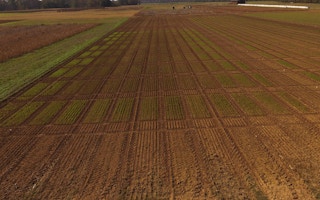A newly released report by the Boston Consulting Group estimates that by 2030, annual food loss and waste will hit 2.1 billion tons, worth $1.5 trillion. And, earlier this year, another study reported that the average American throws away 422 grams (approximately 1 pound) of food every day.
To continue reading, subscribe to Eco‑Business.
There's something for everyone. We offer a range of subscription plans.
- Access our stories and receive our Insights Weekly newsletter with the free EB Member plan.
- Unlock unlimited access to our content and archive with EB Circle.
- Publish your content with EB Premium.
But, food waste is not just an American problem. It is a global problem. According to the United Nations Food and Agriculture Organization (FAO), up to one-third of all the produced globally goes to waste.
Food wastage happens across the entire agricultural food chain. It is caused by many factors including limitations on crop production and other resource-saving agricultural techniques, inadequate transportation and storage infrastructures, changing climate and excess purchases and portions. In a cruel twist, even as humanity wastes so much food, up to 815 million people around the world go to bed hungry.
These alarming statistics are fuelling action and have resulted in the launching of several initiatives by many stakeholders. The UN FAO, for example, lists halving worldwide food waste and substantially reducing global food loss by 2030 as one of its main targets under sustainable development goal number 12. Earlier this year, the European Union (EU) voted to adopt its first ever EU-wide food waste reduction target, hoping to reduce food waste by 50 per cent by 2025. In 2015, United States Department of Agriculture (USDA) and Environmental Protection Agency, announced the first ever domestic goal to reduce food loss and waste by half by the year 2030.
And in the African continent, where cutting down food waste and reducing food loss is key to ending hunger and malnutrition, countries like Nigeria and Ghana, and research institutions like International Food Policy Research Institute, and funding agencies like the Rockefeller Foundation are stepping up to help tackle the issue of food waste.
But even as they step up to the challenge, it is important to note that there are differences in the causes of food waste between developed and developing countries. In the developed countries, food is wasted mainly by consumers. By contrast, the world’s hungry poor consumer, wastes very little food. Rather, food waste happens during food production mainly because of inefficient agriculture, climate-induced crop failures, and inadequate infrastructures to help store food once its produced.
This newly released report projecting an increase in the food waste by 33 per cent in the next 10 years, despite the above initiatives calls for more action. It necessitates that we scale up the current efforts and further tap into innovations and recent technologies including the use of biotech tools. Every tool helps.
For developing countries, where much of the food is wasted because of climate induced failures, and the limited access by farmers to resource saving agricultural techniques, efforts geared towards helping farmers to employ a wide range of tools and draw from newer innovations including climate smart agricultural practices and use of biotech crops, commonly known as GMOs, must be stepped up.
The benefits that can arise from planting such crops are numerous and include increase in crop yields, which in turn leads to the attainment of food security, conservation of biodiversity, improvement of soil health, reduction in costs associated with agricultural inputs needed to grow crops, reductions in the use of water needed to grow crops and the enhancement of plants’ ability to cope with climate change. Most importantly is that biotech crops can help farmers mitigate the food waste and losses associated with climate induced failures.
“
Food wastage is a global issue and tackling it will require stakeholders to employ a broad array of tools and innovative solutions including those offered by biotechnology.
Food continues to be wasted in developed countries by consumers and retailers because of quality standards that put emphasis on the aesthetic appearance of food. To counteract this, there is need to pass innovative policies that strategically give incentives such as tax breaks to retail companies and food sellers who do not throw away food just because it is ugly or unaesthetically pleasing to consumers. Doing so would help mitigate food wastage.
The truth is, at the end, it boils down to individual consumer behaviour. It is our individual behaviours including buying excessive portions, buying more food than we need, not keeping up with expiry dates of foods stored in our fridges that contributes to food waste. There are many actions and positive behaviour changes that can be done by consumers. Collectively, positive behaviours would help reduce this global issue. Progressively, there are several resources created by various stakeholders including the USDA, UN FAO, and advocacy organisations such as GMOanswers that offer consumers with a plethora of actions they can take to cut down on food waste.
Above all, it is noteworthy mentioning that reducing food waste has financial benefits to companies, retailers, governments and other stakeholders. According to the BCG report, tackling food waste represents a $700 billion-dollar investment opportunity. If tackled properly, food waste issue can become an investment opportunity. The wasted food can not only help feed the hungry, it can also help create jobs.
Food wastage is a global issue and tackling it will require stakeholders to employ a broad array of tools and innovative solutions including those offered by biotechnology.
Esther Ngumbi is a post-doctoral researcher at the University of Illinois at Urbana-Champaign. This article is written exclsively for Eco-Business.











